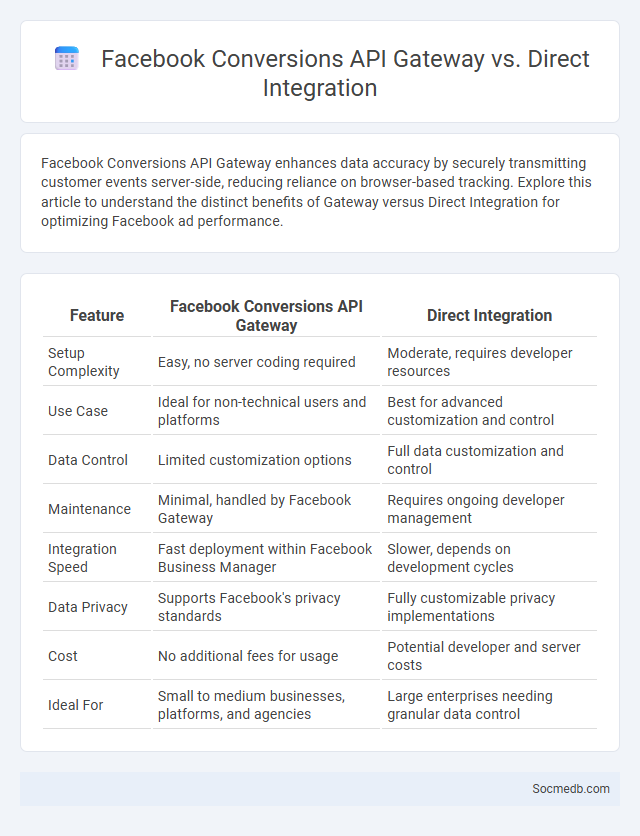
Photo illustration: Facebook Conversions API Gateway vs Direct Integration
Facebook Conversions API Gateway enhances data accuracy by securely transmitting customer events server-side, reducing reliance on browser-based tracking. Explore this article to understand the distinct benefits of Gateway versus Direct Integration for optimizing Facebook ad performance.
Table of Comparison
| Feature | Facebook Conversions API Gateway | Direct Integration |
|---|---|---|
| Setup Complexity | Easy, no server coding required | Moderate, requires developer resources |
| Use Case | Ideal for non-technical users and platforms | Best for advanced customization and control |
| Data Control | Limited customization options | Full data customization and control |
| Maintenance | Minimal, handled by Facebook Gateway | Requires ongoing developer management |
| Integration Speed | Fast deployment within Facebook Business Manager | Slower, depends on development cycles |
| Data Privacy | Supports Facebook's privacy standards | Fully customizable privacy implementations |
| Cost | No additional fees for usage | Potential developer and server costs |
| Ideal For | Small to medium businesses, platforms, and agencies | Large enterprises needing granular data control |
Understanding Facebook Conversions API: An Overview
Facebook Conversions API enables businesses to directly share customer actions from their servers to Facebook, improving data accuracy and ad targeting. This server-to-server integration bypasses browser limitations like ad blockers and cookie restrictions, resulting in more reliable conversion tracking. Implementing Facebook Conversions API enhances campaign performance by providing richer, privacy-compliant insights into user behavior and attribution.
What is the Conversions API Gateway?
The Conversions API Gateway is a Facebook Business tool designed to improve data accuracy by directly connecting your server with Facebook's systems, bypassing browser limitations like ad blockers or cookie restrictions. This server-side integration captures crucial conversion events, enhancing your ad targeting and measurement capabilities while complying with privacy regulations. You can leverage the Conversions API Gateway to ensure more reliable tracking of customer interactions and optimize your social media advertising campaigns effectively.
Direct Integration: How Does It Work?
Direct integration in social media allows You to seamlessly connect your platforms with various apps and tools, enabling automatic content sharing and real-time updates. By using APIs and embedded plugins, this process ensures smooth data synchronization and enhances user engagement across channels. Efficient direct integration streamlines your workflow, saves time, and boosts the overall effectiveness of your social media strategy.
Comparing API Gateway vs Direct Integration
API Gateway offers centralized management, enhanced security, and rate limiting for social media platform integrations, enabling scalable and controlled access to multiple APIs. Direct Integration connects applications directly to social media APIs, providing faster interactions but lacking the unified security policies and analytics that API Gateways deliver. Organizations prioritizing streamlined monitoring and consistent access controls typically prefer API Gateway over Direct Integration for social media API management.
Conversion Tracking Methods Explained
Conversion tracking methods on social media platforms enable you to measure the effectiveness of your campaigns by monitoring specific user actions, such as clicks, purchases, or sign-ups. Tools like Facebook Pixel, Google Tag Manager, and LinkedIn Insight Tag collect data that helps optimize ad targeting and improve ROI. Understanding these tracking methods ensures your marketing efforts align with your business goals and deliver measurable outcomes.
Setup and Configuration Differences
Social media platforms vary significantly in setup and configuration, with each offering unique account creation processes, privacy settings, and content management tools tailored to different user needs. Facebook emphasizes detailed profile customization and granular privacy controls, while Instagram focuses on streamlined setup for visual content sharing with simpler privacy options. Twitter provides a quick setup for real-time updates and public engagement but incorporates specific settings for tweet visibility and interaction controls.
Data Privacy and Security Considerations
Social media platforms handle vast amounts of personal data, making data privacy and security considerations critical to protect Your information from unauthorized access and misuse. Implementing strong encryption, transparent privacy policies, and regular security audits can mitigate risks such as data breaches and identity theft. Users should remain vigilant about privacy settings and be aware of the data-sharing practices of each social media service they utilize.
Accuracy and Reliability of Conversion Data
Accurate conversion data on social media platforms enables precise measurement of campaign performance, directly impacting return on investment analysis. Reliable tracking tools, such as Facebook Pixel or Google Analytics, help attribute conversions to specific ads, ensuring data integrity and informed decision-making. Ensuring data accuracy requires regular validation and cross-checking with first-party data to minimize discrepancies caused by attribution errors or tracking issues.
Scalability and Maintenance Comparison
Scalability in social media platforms depends on robust infrastructure capable of handling exponential user growth and real-time data processing. Your ability to maintain seamless performance relies on continuous updates, efficient codebase management, and automated monitoring systems that reduce downtime and support rapid feature deployment. Comparing platforms, those using cloud-native architectures and microservices offer superior scalability and easier maintenance compared to monolithic systems.
Choosing the Best Facebook Conversions Solution for Your Business
Choosing the best Facebook conversions solution involves analyzing your business goals, target audience, and budget to maximize ad performance and ROI. Utilizing Facebook Pixel and Conversions API together ensures accurate tracking and data-driven decisions for your campaigns. You can enhance your marketing strategy by integrating these tools to optimize conversion tracking and improve overall results.
 socmedb.com
socmedb.com